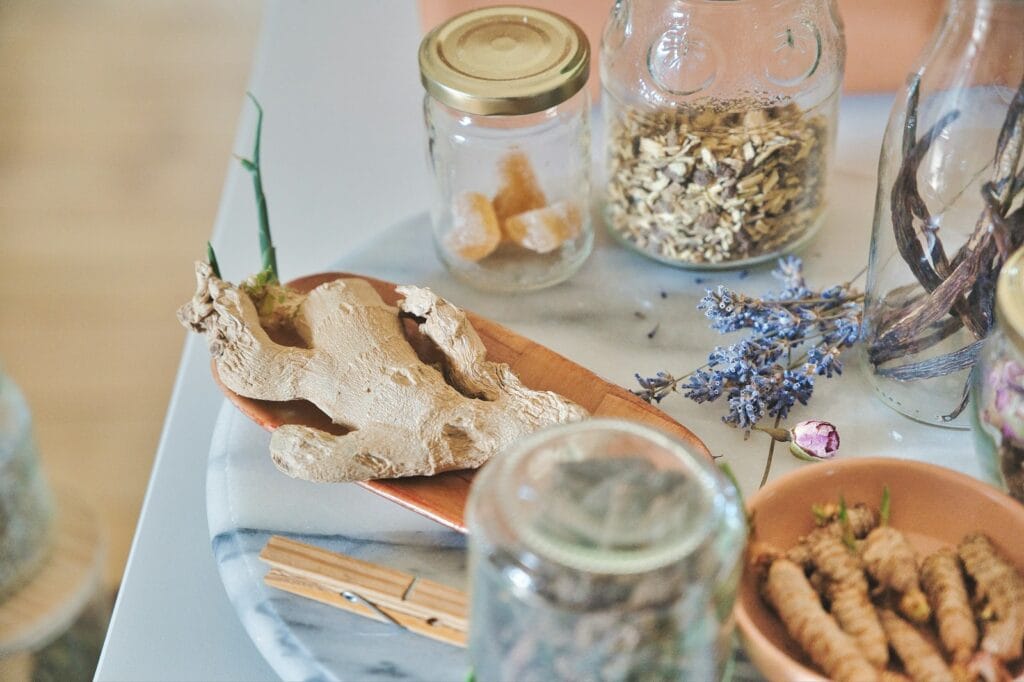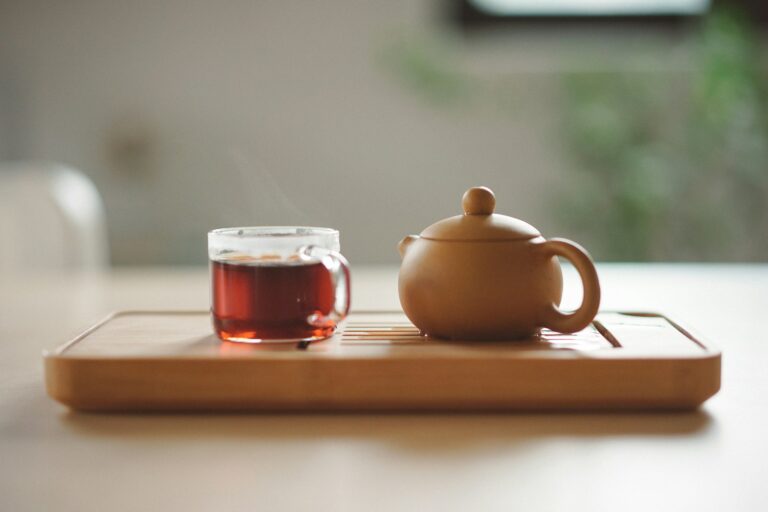Feeling tired or just kind of blah lately? You’re definitely not the only one. Life gets busy, and it’s easy to hit those energy slumps or mood dips. Natural remedies—like herbs, better sleep, and handling stress—can lift your energy without the crash you get from energy drinks or too much coffee.
When your energy’s low, small tweaks can really help. Managing stress is a big one, since stress can zap your energy fast. Moving more during the day, sleeping better, and using simple natural boosters like peppermint oil can give you a quick lift without weird side effects.
What you eat matters, too. Some herbs can boost energy and focus, especially if you’re eating well overall. Instead of reaching for another coffee when you hit that afternoon wall, there are natural options that support your energy without messing up your sleep.
Key Takeaways
- Managing stress, sleeping well, and moving your body can give you more energy—no caffeine crash required.
- Herbs and plant remedies can help your mood and focus, especially if you use them regularly.
- Simple tweaks to what and when you eat can keep your energy steady all day.
Fundamental Lifestyle Changes to Boost Mood and Energy
You don’t need fancy gear or pricey supplements—just a few changes to your daily routine can really lift your mood and energy.
The Role of Regular Exercise and Physical Activity
Exercise is a tried-and-true way to boost energy. Even a quick 10-minute walk can perk you up for hours. Moving your body gets your blood flowing and helps your heart and lungs work better.
When you’re active, your body releases endorphins—those feel-good chemicals that help with stress and make you happier. It’s hard to argue with that.
Try for about 30 minutes of moderate exercise most days. That could be:
- Walking
- Swimming
- Cycling
- Dancing
- Strength training
If you’re just starting out, take it slow and build up. Even a little movement is better than none and can change how you feel.
Improving Sleep Quality and Maintaining a Consistent Sleep Schedule
Bad sleep is a major energy killer. Your body needs good rest to recharge.
Stick to a regular sleep schedule—go to bed and wake up at the same time every day, weekends included. It helps set your body’s internal clock.
Make bedtime relaxing. Maybe read, take a warm bath, stretch gently, or put on calming music.
Try to avoid screens before bed—the blue light messes with your melatonin. Keep your bedroom dark, quiet, and cool for the best sleep.
If you find it hard to sleep, skip caffeine and alcohol in the evening. They can mess with your sleep and leave you groggy the next day.
Effective Stress Management Techniques
Stress is sneaky—it drains your energy and can really mess with your mood. Stress-related emotions eat up a lot of energy.
A few ways to handle stress:
- Meditation: Even 5-10 minutes helps lower stress hormones.
- Deep breathing: The 4-7-8 method is simple and effective.
- Journaling: Writing things down can clear your head.
- Nature time: Just being outside can make a difference.
Don’t be afraid to say no if you’re overloaded. Setting boundaries can really help.
Take short breaks during your day—even a quick pause can help you reset and get your focus back.
Hydration and the Importance of Drinking Water
Not drinking enough water is a surprisingly common reason for feeling tired and cranky. Even a little dehydration can mess with your mood and focus.
Water moves nutrients to your cells and helps your body get rid of waste. It keeps your joints working smoothly and helps regulate your temperature, too.
Aim for about 8 glasses (64 ounces) a day, but you might need more if you’re active or it’s hot out. Keep a water bottle nearby as a reminder.
Signs you might be dehydrated:
- Thirst
- Dark yellow pee
- Headaches
- Fatigue
- Dry mouth or lips
If plain water isn’t your thing, add a splash of lemon, cucumber, or some berries. Herbal teas count, too, and can give you a little extra benefit.
Natural Remedies and Herbal Solutions
When your energy or mood is low, nature has quite a few tricks up its sleeve. These options work with your body, not against it.
Adaptogenic Herbs for Mood and Mental Energy
Adaptogenic herbs help your body handle stress and can give your energy a nice boost. They balance your body’s systems and support your adrenals.
Some top adaptogens:
- Ashwagandha: Lowers stress hormones, may ease anxiety
- Rhodiola Rosea: Fights fatigue, helps you think more clearly
- Ginseng: Boosts energy and focus
- Holy Basil: Calms your mind, supports mood
You can take these as capsules, teas, or tinctures. They usually work best if you use them regularly, not just when you’re wiped out.
A lot of herbs for depression work gradually, so give it a couple of weeks before deciding if they’re helping.
Aromatherapy with Essential Oils
Your sense of smell is directly tied to your mood. That’s why aromatherapy can shift how you feel in just a few minutes.
Oils that help boost mood and energy:
- Peppermint (for alertness)
- Lavender (for calm)
- Citrus oils (for a lift)
- Rosemary (for focus)
Use them in a diffuser, add a few drops to your bath, or mix with a carrier oil for a massage. Peppermint is great for that afternoon slump—just inhale or dab a little (diluted) on your temples.
If sleep is an issue, try lavender near your pillow. Using the same scent for relaxation can train your brain to wind down.
Mindfulness Practices: Meditation, Yoga, and Massage
Mind-body practices are a solid way to cut stress—one of the biggest energy drains.
Easy ways to add mindfulness:
- Meditation: Even 5 minutes can help. Apps are handy if you’re not sure where to start.
- Yoga: Moves, breathing, and focus all in one. Try gentle flows in the morning or calming poses at night.
- Massage: Loosens up tight muscles and helps with fatigue. Even a quick hand or shoulder rub can help.
Walking is great, too. Your body releases feel-good chemicals just by moving.
These practices can help break the cycle of stress and low energy.
Music and Mood Enhancement
Music is powerful—it can totally change your mood.
Ways to use music for energy and mood:
- Fast songs (120+ BPM) wake you up and get you moving
- Nature sounds can help you relax
- Your favorite tunes boost dopamine, making you feel happier
- Drumming or strong rhythms can energize you
Make playlists for different times—something upbeat for mornings, calming tracks for when you need to chill, and uplifting songs when you’re down.
Don’t just sit and listen—sing, tap your feet, or dance if you feel like it. Even 15 minutes can make a difference.
Music pairs well with other remedies like herbs or exercise for an even bigger mood and energy boost.
Optimizing Nutrition for Sustained Energy and Mood
What you eat really does affect your energy and mood. The right foods can help you feel steady and focused all day.
Nutritious Breakfast and Energy-Boosting Foods
A good breakfast sets the tone for your day. Protein and fiber in the morning help keep you from crashing before lunch.
Some easy breakfast ideas:
- Oatmeal with nuts and berries
- Greek yogurt with fruit and granola
- Eggs and whole grain toast
- Smoothies with protein and spinach
Certain foods are natural energy boosters. Chia seeds, for example, release energy slowly and were used by the Mayans for stamina.
Bananas, apples, and oranges are quick sources of natural sugar and fiber, so you get energy without a sugar crash.
Balancing Macronutrients: Protein, Healthy Fats, and Fiber
Your body needs a mix—protein, healthy fats, and carbs—to keep your energy and mood balanced.
Protein helps you feel full and keeps your energy steady. Try lean meats, fish, beans, or tofu.
Healthy fats are important for your brain and mood. Avocados, olive oil, nuts, and fatty fish are all good picks.
Fiber slows digestion and keeps you full. Whole grains, veggies, fruits, and beans are great sources.
Aim for a plate that’s about 1/4 protein, 1/4 complex carbs, and half veggies and fruit.
The Importance of B Vitamins and Vitamin D
B vitamins help your body turn food into energy. If you’re low, you might feel tired or down.
Some key B vitamins:
- B12: In animal products, helps with red blood cells
- B6: In poultry, fish, potatoes—important for brain chemicals
- Folate: In leafy greens and beans, helps new cells grow
- B2 (Riboflavin): In dairy and whole grains, supports energy production
Vitamin D is also important for mood and energy. Low levels are linked with tiredness and even depression. You get vitamin D from sunlight, but also from:
- Fatty fish like salmon
- Egg yolks
- Fortified foods
- UV-exposed mushrooms
Stabilizing Blood Sugar with Complex Carbs and Mini-Meals
Keeping your blood sugar steady helps you avoid energy crashes.
Complex carbs with a low glycemic index release energy slowly. Good choices:
- Whole grains (brown rice, oats, quinoa)
- Beans and lentils
- Sweet potatoes
- Most fruits and veggies
Eating smaller meals or snacks every few hours can help keep your energy up. It’s better than waiting until you’re starving.
Some smart mini-meals: apple with nut butter, hummus and veggies, or a handful of nuts and dried fruit. These give you a nice balance of protein, fat, and carbs.
Beverages for Enhanced Alertness and Focus
What you drink matters for your energy and focus, too. The right drinks can help you stay sharp and productive.
Caffeine in Moderation: Coffee, Green Tea, and Dark Chocolate
Coffee is a go-to for many. The caffeine blocks adenosine in your brain, making you feel more awake. Stick to 1-2 cups in the morning to avoid crashes later.
Green tea is a gentler option. It has less caffeine than coffee, plus L-theanine, which helps you focus. You get alertness without the jitters.
Hot dark chocolate isn’t just tasty—it’s good for your brain. Flavanols boost blood flow, which can help you focus. Pick chocolate with at least 70% cocoa and not too much sugar.
Caffeine Content Comparison:
| Beverage | Caffeine (avg) | Other Benefits |
|---|---|---|
| Coffee (8oz) | 80-100mg | Antioxidants |
| Green Tea (8oz) | 25-45mg | L-theanine, polyphenols |
| Dark Chocolate (1oz) | 12-20mg | Flavanols, magnesium |
Herbal Teas and Natural Energy Drinks
Herbal teas can give you a gentle mental boost without the jitters of caffeine. Ginkgo biloba tea might help sharpen memory and attention. Peppermint tea? It’s known to perk you up and ease that sluggish, foggy feeling.
Rosemary and ginger teas bring their own unique aromas and can wake up your mind, especially in the afternoon when your energy dips but you don’t want to risk messing up your sleep later.
Some natural energy drinks combine nootropic ingredients like B-vitamins and plant extracts. If you’re looking for something besides caffeine, check out drinks with ginkgo biloba, rhodiola, or bacopa. It’s usually best to skip the ones loaded with artificial colors or tons of sugar.
Brain-Supporting Herbal Teas:
- Ginkgo biloba (memory and circulation)
- Peppermint (alertness and focus)
- Rosemary (mental clarity)
- Ginger (anti-inflammatory, improves circulation)
Hydrating with Coconut Water
Water’s still the gold standard for keeping your brain sharp. Even a little dehydration can mess with your focus, memory, and energy. Try to get at least 8 glasses a day, though let’s be honest, some days that’s easier said than done.
Coconut water steps up the hydration game by adding natural electrolytes. The potassium, magnesium, and calcium help your body keep fluids balanced, which benefits your brain too. It tends to keep you hydrated longer than plain water.
Go for plain, unsweetened coconut water—skip the sugary, flavored stuff. If you want a little zing, add a squeeze of lime. It’s especially refreshing mid-morning or after a workout when you need to rehydrate.
Limiting Alcohol for Better Mental Function
Alcohol messes with your brain’s communication pathways. Even a couple of drinks can make it harder to focus, cloud your memory, and wreck your sleep, which leaves you groggy the next day.
If you do have a drink, try to follow it with a glass of water to offset dehydration and its brain-draining effects. Set some boundaries—aim for no more than 1 or 2 drinks at a time.
Taking a few alcohol-free days each week can make a noticeable difference. Folks often say they feel clearer, sleep better, and just have more get-up-and-go. And if you’ve got something important coming up that needs your full attention, it’s probably smart to skip the drinks the night before.
Frequently Asked Questions
People are always searching for natural ways to boost mood and energy. Here are some questions and answers about supplements, vitamins, herbs, and other non-prescription options that might help.
What natural supplements are known to help with depression?
St. John’s Wort has been shown in some studies to help with mild to moderate depression. It works a bit like prescription antidepressants by increasing serotonin in the brain.
Omega-3s from fish oil might also ease depression symptoms. They seem to support brain function and fight inflammation linked to mood issues.
SAM-e (S-adenosylmethionine) is a naturally occurring compound that may lift mood by boosting serotonin and dopamine. In Europe, it’s even prescribed for depression.
Which vitamins are considered effective for reducing mood swings and anxiety?
B vitamins—especially B6, B12, and folate—are crucial for brain health and mood balance. If you’re low in these, anxiety and mood swings can get worse.
Vitamin D is another big one. Low levels are tied to mood problems and anxiety, so spending some time in the sun or taking a supplement can help.
Magnesium helps manage the neurotransmitters that affect your mood. A lot of people don’t get enough from food, so supplements might make a difference with anxiety or mood swings.
What are the top natural remedies for enhancing mood?
Exercise boosts mood by releasing endorphins. Even a quick 10-minute walk can lift your spirits for hours.
Spending time outdoors is a simple way to lower stress and feel better mentally. Try to get outside for at least 20 minutes a day if you can.
Getting enough sleep really matters for mood. Bad sleep habits can make depression and anxiety worse.
How can one quickly increase their energy levels naturally?
Drinking water is one of the fastest ways to perk up. Even being a little dehydrated can make you tired and foggy.
Eating small, balanced meals throughout the day helps keep your blood sugar steady. Try to include some protein, healthy fat, and complex carbs.
Adding seeds like chia, pumpkin, and flax to your meals gives you lasting energy from healthy fats and protein.
Which herbs are renowned for their mood-boosting properties?
Ashwagandha helps fight fatigue and lowers stress by cutting down on cortisol. As an adaptogen, it helps your body handle stress better.
Rhodiola rosea can boost your energy and mental performance, especially when you’re feeling stressed or worn out.
Lavender is famous for its calming effects. It can ease anxiety and help you sleep, whether you drink it as tea, use essential oil, or try a supplement.
What are the best non-prescription options for stabilizing mood and increasing energy?
Controlling stress with meditation, deep breathing, or even a bit of yoga can help keep your energy up and your mood in a better place. Stress and all the emotions that tag along with it tend to drain your energy—sometimes way more than you’d expect.
Connecting with others is surprisingly powerful for mental health. Hanging out with friends or family, or just chatting with someone who gets you, can make a real difference when it comes to keeping your mood steady.
Limiting caffeine intake might sound tough at first, but it can actually help your energy last longer. Sure, caffeine gives you that quick lift, but overdoing it? That can leave you feeling wiped out later.




